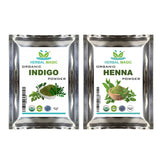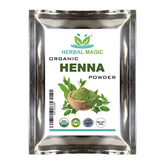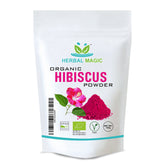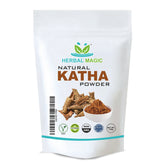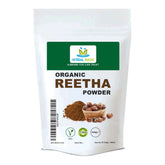How To Use Natural Hair Dye Made With Henna and Indigo Powder?
When it comes to aging, there’s no more obvious sign than gray hair. Store-bought hair dyes are a convenient and proven safe solution to this problem. However, scientifically there are proofs that the chemicals they contain may be harmful to your hair in the long run. So, always prefer to buy natural hair care products like Henna.
Fortunately, there's a healthy approach to this problem. To shoo away the grey hair is to dye it, which has become a part of most people's hair care routine.
One of the best solutions to this problem is application of indigo and henna powder. It is a natural and healthier alternative that will help you cut down on chemicals while giving you lovely, dark black locks.
The color of hair dye, on the other hand, is not permanent. It fades with time, necessitating reapplication every few weeks. Many people who dye their hair on a regular basis are concerned about this. Which hair dyes are safe to use on a regular basis? Is natural henna hair dye preferable? How do you naturally get your hair black?
Let us walk you through the answers to all your concerns one by one in the following manner-
How To Use Natural Hair Dye Made With Henna and Indigo Powder!
1. About indigo and organic black henna hair dye
For ages, henna & indigo have been used, they are organic hair products as henna dye is made from the crushed leaves of the Lawsonia Inermis plant, which has the botanical name Lawsonia Inermis. Indigo dye is made from the crushed leaves of the indigo plant, which has the scientific name Indigofera Tinctoria. Indigo was previously a valuable commodity known as 'blue gold’. These two herbs have been used for ages to color hair.
2. How are Indigo herbal hair dye and Henna hair dye made?
Indigo:
This shrub thrives in the wild and is cultivated in tropical locations all over the world. Indigo powder, the well-known blue dye, is extracted from the indigo plant's leaves. The extract can be acquired in the form of lumps or chips (both of which must be ground before usage) or as a fine powder. Indigo is also available as a leaf powder, which is gathered, dried, and pulverized. This type is used for hair coloring and direct application. Don't be perplexed by the plethora of possibilities for purchasing indigo powder for hair online. Check the ingredients list and ensure that the Indigo powder is 100 percent natural and organic while looking for the best Indigo Powder for hair.
Advantages -
- Indigo powder hair dye is a natural hair dye that won't affect your hair in any way.
- Indigo herbal hair dye gives your hair a rich brown color when combined with henna.
- It produces a luscious black color when applied to henna-treated hair.
- The use of indigo powder on the hair on a regular basis can treat and prevent premature greying.
- It was discovered that indigo extracts stimulate fresh hair growth.
Henna-
Henna is a plant that thrives in hot, dry areas (Lawsonia Inermis). The leaves are gathered, dried, and powdered into a fine powder. Later, they are mixed into a paste and used to color hair, skin, and even fingernails.
Advantages-
- The use of Henna hair dye preserves scalp health.
- Henna has a cooling effect on your scalp.
- Its antifungal and antibacterial characteristics aid in the maintenance of scalp health by combating numerous scalp ailments such as dandruff, scalp irritation, and so on.
- It aids in the removal of impurities from the hair.
- Regulates PH levels and increases oil production.
- Eliminates extra oils from your hair, unclogging follicles and restoring normal sebaceous gland function
- Provide nourishment to your hair.
- Seals the hair cuticle, resulting in more glossy hair locks. This does help to improve hair elasticity.
- Henna aids in the formation of a protective barrier around each of your hair shafts, trapping in moisture and keeping your hair conditioned.
- Henna aids in the prevention of split ends and hair breakage.
3. Using Henna and Indigo hair color for black hair-
It's a two-step technique to color your hair with henna and indigo for black hair. You can't just combine the two since you'll end up with brown or auburn hair. To achieve stunning black tresses, first, apply henna to your hair before applying indigo.
Ingredients (adjust the proportions as per your hair length):
- Henna powder
- Indigo powder
- Juice of 1 lemon
- Salt
- Cornstarch
- Water
4. How to treat using henna hair dye for gray hair?
Buy natural henna powder for hair. Soak the henna powder with a dash of lemon juice in the mixing bowl in the amount mentioned above for the desired hair length.
Add water, keep stirring it constantly, until you have a thick paste.
Cover the bowl with plastic wrap and let it overnight to allow the henna color to release.
The next day, apply the paste to clean, product-free hair. Leave it on for 45-60 minutes, depending on the severity desired.
Rinse well with just water and repeat as needed.
5. How to treat using organic Indigo powder for black hair?
Mix together indigo powder, salt, and cornstarch and gradually add water to make a thick mixture.
Divide your hair into sections and apply the indigo paste in the same manner that you did the henna.
Depending on the intensity desired, leave on for 45 minutes or more. To achieve a deep black color, leave it on your hair for up to 2 hours.
Thoroughly rinse with water.
Don't wash your hair with a cleansing shampoo on the same day. It is recommended to wash your hair using shampoo after 24 hours.
These two methods are proven to be working wonderfully. It will give you the required natural black hair color. Henna's brown color and indigo hair color will give your hair a vibrant black look. This approach can be used to color your hair twice or three times every month.
6. Using Henna and Indigo hair color for brown hair
Hair can be colored brown by using henna and indigo together or just by using henna.
This is a one-step method that takes around half the time it takes to color your hair black.
Ingredients:
- Buy Henna powder
- Indigo powder
- Yogurt
- Salt
- Water
Steps:
- In a bowl, combine the henna powder and yogurt, then gently add and whisk in the water until you have a thick paste.
- Cover the bowl with plastic wrap and set it aside overnight to let the henna color release.
- The next morning, add the indigo powder and salt to the henna paste. You can alter the paste's consistency by adding more water.
- After you've applied the paste to all of your hair, twist it up into a bun and cover it with a shower cap.
- Leave it on for 2 hours.
- Wash it off with lukewarm water. Use no shampoo or conditioner for the next 24 hours.
7. Common concerns regarding Indigo and Henna use are addressed here-
Is it safe to use Henna and Indigo organic hair products directly?
Yes, indigo and henna hair color powder is completely safe to use. But we suggest you perform a patch test on your forearm to check that you are not allergic to either of these natural hair dyes.
Care to be taken during application.
Wrap an old towel around your shoulders and put on your rubber gloves to avoid making a mess. Keep in mind that the dye may stain your clothes.
Can one dye on chemically treated hair?
On chemically treated hair, it is safe to use natural and 100 percent henna and indigo. It is recommended to wait 5-6 weeks between chemical treatments and hair coloring.
How long does the hair color last?
The color usually lasts 4-6 weeks, depending on the thickness, temperature, and natural color of your hair.
How often can you use Indigo hair dye?
You can use Indigo powder hair dye on your hair weekly.
How often can you apply henna to your hair?
You can henna as frequently as you wish to keep your hair color looking great. You can either dye your hair once a week or once every few months. Depending on the amount of indigo or henna in your chosen brick, frequent applications may also darken or brighten the color.
Can henna make you sick?
As far as it is safe for most adults, it is important you go through a quick allergy test. Make sure you buy natural henna powder for hair. However, if it is not natural, it might cause dermatitis (skin irritation), itching, swelling, redness, scaling, burning, broken skin, and scarring of the skin. It may occasionally induce allergic symptoms such as runny nose, wheezing, hives, and asthma.
In a nutshell, we all have different definitions of beauty! You can experience the ever-changing stages of your life, embrace it, and still call yourself beautiful. Hair growing to be grey is just another process as you age, which is natural. But again, we all have different definitions of beauty. It is completely alright if you choose to keep your hair brown or black forever. Just be sure that you use 100% natural Henna and Indigo powder.

